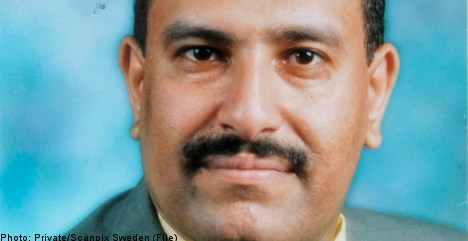Agiza, along with fellow Egyptian national Mohammed Alzery, were forcibly handed over to the CIA by Swedish agents as part of a so called terror suspect “rendition” operation carried out by the US spy agency.
The deportations were criticised by both the United Nations and several human rights groups.
Agiza was released from Egyptian custody following the Egyptian revolution and he has expressed a wish to return to his family in Sweden.
At the time of his deportation he was assessed as a security risk and according to Säpo head Anders Danielsson the service is now considering flying to Egypt to conduct a new assessment of Agiza’s case.
“An assessment has to be made based on the current facts,” Anders Danielsson told Sveriges Radio (SR).
Karlstad-resident Agiza spent almost ten years in a cell in the Tora prison in Cairo, convicted by a military court of having been a member of a terror-linked organisation.
The decision to release Agiza was made by the social democratic government in Egypt at the behest of the United States and has been welcomed by international human rights organizations.
However, he has several lasting injuries from the torture he suffered while in Egyptian prison. Among other things, his nose was broken, making it difficult for him to breath.
“I’ve been able to meet with a specialist at a centre for torture injuries to receive help. The problem is that my brain is in high gear even when I sleep,” he told TV4 at the time of his release.
In 2009, Agiza had his application for a Swedish residency permit denied based on secret information held by Swedish security service Säpo.
Agiza has however repeatedly insisted that he has never been a threat.
Agiza and Alzery have received 3 million kronor ($464,000) each in compensation from the Swedish state.



 Please whitelist us to continue reading.
Please whitelist us to continue reading.
Member comments